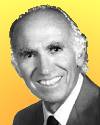 (source)
(source)
|
Jonas Salk
(28 Oct 1914 - 23 Jun 1995)
American physician and microbiologist.
|
Science Quotes by Jonas Salk (13 quotes)
Reply when questioned on the safety of the polio vaccine he developed: It is safe, and you can’t get safer than safe.
— Jonas Salk
J. R. Wilson, Margin of Safety (1963), 98.
As the human fetus develops, its changing form seems to retrace the whole of human evolution from the time we were cosmic dust to the time we were single-celled organisms in the primordial sea to the time we were four-legged, land-dwelling reptiles and beyond, to our current status as largebrained, bipedal mammals. Thus, humans seem to be the sum total of experience since the beginning of the cosmos.
— Jonas Salk
From interview with James Reston, Jr., in Pamela Weintraub (ed.), The Omni Interviews (1984), 99. Previously published in magazine, Omni (May 1982).
Eventually, we’ll realize that if we destroy the ecosystem, we destroy ourselves.
— Jonas Salk
From interview with James Reston, Jr., in Pamela Weintraub (ed.), The Omni Interviews (1984), 105. Previously published in magazine, Omni (May 1982).
Personal Library
I couldn’t possibly have become a member of this Institute [the Salk Institute], you know, if I hadn’t organized it myself.
— Jonas Salk
In R. Carier, Breakthrough: The Saga of Jonas Salk (1966), 413.
I see the whole of humankind becoming a single, integrated organism. … I look upon each of us as I would an individual cell in the organism, each of us playing his or her respective role.
— Jonas Salk
From interview with James Reston, Jr., in Pamela Weintraub (ed.), The Omni Interviews (1984), 109. Previously published in magazine, Omni (May 1982).
I would picture myself as a virus, or as a cancer cell, for example, and try to sense what it would be like to be either. I would also imagine myself as the immune system, and I would try to reconstruct what I would do as an immune system engaged in combating a virus or cancer cell. When I had played through a series of such scenarios on a particular problem and had acquired new insights, I would design laboratory experiments accordingly… Based upon the results of the experiment, I would then know what question to ask next… When I observed phenomena in the laboratory that I did not understand, I would also ask questions as if interrogating myself: “Why would I do that if I were a virus or a cancer cell, or the immune system?” Before long, this internal dialogue became second nature to me; I found that my mind worked this way all the time.
— Jonas Salk
In Anatomy of Reality: Merging of Intuition and Reason (1983), 7, footnote b, as quoted and cited in Roger Frantz, Two Minds: Intuition and Analysis in the History of Economic Thought (2006), 7.
IT IS SAID TO AWAIT CERTAINTY IS TO AWAIT ETERNITY.
— Jonas Salk
Telegram to Basil O’Connor (8 Nov 1954). In J. S. Smith, Patenting the Sun: Polio and the Salk Vaccine (1990), 295.
My ambition was to bring to bear on medicine a chemical approach. I did that by chemical manipulation of viruses and chemical ways of thinking in biomedical research.
— Jonas Salk
From interview (1980) quoted in New York Times (24 Jun 1995), 9.
Well, the people, I would say. There is no patent. Could you patent the sun?
[On being asked who owned the patent on his polio vaccine by journalist, Edward R. Murrow in 1954.]
[On being asked who owned the patent on his polio vaccine by journalist, Edward R. Murrow in 1954.]
— Jonas Salk
Quoted in The Economist (14 Aug 1999), 11. In Howard Gardner, et al., Good Work (2002), 111.
When I worked on the polio vaccine, I had a theory. Experiments were done to determine what might or might not occur. I guided each one by imagining myself in the phenomenon in which I was interested. The intuitive realm is constantly active—the realm of imagination guides my thinking.
— Jonas Salk
From interview with James Reston, Jr., in Pamela Weintraub (ed.), The Omni Interviews (1984), 98. Previously published in magazine, Omni (May 1982).
When you inoculate children with polio vaccine, you don’t sleep well for two or three months.
— Jonas Salk
As quoted without citation in Greer Williams, Virus Hunters (1959), 289. Webmaster found on the web that, allegedly, the quote is as told to reporters (11 Oct 1954) and reported for the Associated Press from Pittsburgh by Saul Pett—but Webmaster has not found such a print story for verification. The quote appears widely duplicated and circulated, but none found have a citation to a primary print source. Some specify weeks, others say months. Please contact Webmaster if you have a definitive reference to a newspaper article.
You must remember that nothing happens quite by chance. It’s a question of accretion of information and experience … it’s just chance that I happened to be here at this particular time when there was available and at my disposal the great experience of all the investigators who plodded along for a number of years.
— Jonas Salk
on his discovery of the polio vaccine, in Breakthrough: The Saga of Jonas Salk by Richard Carter (1965).
You never have an idea of what you might accomplish. All that you do is you pursue a question. And see where it leads.
— Jonas Salk
From video interview on achievement.org website (16 May 1991)
Quotes by others about Jonas Salk (1)
No one had ever picked my brains about influenza so expertly as he did.
[Recalling when had met young Jonas Salk, Ann Arbor (1943).]
[Recalling when had met young Jonas Salk, Ann Arbor (1943).]
In M. Burnet, Changing Patterns: an Atypical Autobiography (1968), 169.
See also:
- 28 Oct - short biography, births, deaths and events on date of Salk's birth.
- Jonas Salk: Beyond the Microscope, by Victoria Sherrow. - book suggestion.
- Booklist for Jonas Salk.
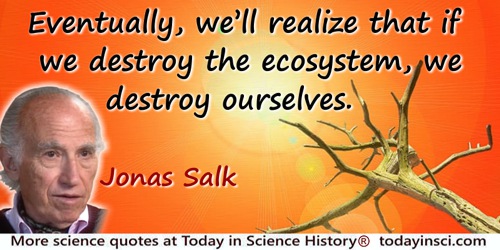


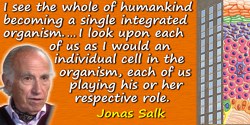
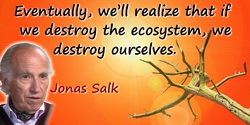
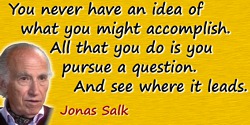
 In science it often happens that scientists say, 'You know that's a really good argument; my position is mistaken,' and then they would actually change their minds and you never hear that old view from them again. They really do it. It doesn't happen as often as it should, because scientists are human and change is sometimes painful. But it happens every day. I cannot recall the last time something like that happened in politics or religion.
(1987) --
In science it often happens that scientists say, 'You know that's a really good argument; my position is mistaken,' and then they would actually change their minds and you never hear that old view from them again. They really do it. It doesn't happen as often as it should, because scientists are human and change is sometimes painful. But it happens every day. I cannot recall the last time something like that happened in politics or religion.
(1987) -- 


